There is a need to balance the use of technology with human rights in response to the pandemic. Otherwise, we might risk losing the rights and freedoms we had steadily gained over many years.
While COVID-19 continues to ravage the world, there is growing concern that critical messages about the disease that are disseminated by health authorities, telecom companies, and broadcasters are not reaching persons with visual and hearing impairments.
The research report "Bottom-up Connectivity Strategies: Community-led small-scale telecommunication infrastructure networks in the global South" explores the benefits of, and challenges facing, projects of this kind. This week we look at the various technical and operational strategies adopted.
 Connecting the Unconnected: Supporting community networks and other community-based connectivity initiatives
Connecting the Unconnected: Supporting community networks and other community-based connectivity initiatives
This project will contribute to an enabling ecosystem for the emergence and growth of community networks and other community-based connectivity initiatives in developing countries. It is part of a multi-year, multi-donor strategy envisaged to address the human capacity and sustainability challenges, along with the policy and regulatory obstacles, that limit the growth of community-based connectivity initiatives.
 Challenging hate narratives and violations of freedom of religion and expression online in Asia
Challenging hate narratives and violations of freedom of religion and expression online in Asia
This project seeks to protect and promote respect for freedom of religion and expression on the internet, particularly by countering hate speech online on the basis of religion, and generating narratives and discourse that defend secular and diverse opinions touching upon religion. The three-year project focuses on five countries in South and Southeast Asia: Bangladesh, India, Indonesia, Myanmar and Pakistan.
 FIRN: Feminist Internet Research Network
FIRN: Feminist Internet Research Network
The Feminist Internet Research Network is a three-and-a-half-year collaborative and multidisciplinary research project led by APC, funded by the International Development Research Centre. The project draws on the study “Mapping research in gender and digital technology”, and the Feminist Principles of the Internet collectively crafted by feminists and activists, primarily located in the global South.
Global Information Society Watch (GISWatch) is an annual report co-produced by the APC network and partners, which looks at the progress being made in creating an inclusive information society worldwide (particularly in implementing WSIS goals), encourages critical debate, and strengthens networking and advocacy for a just, inclusive information society.
My last four blogs discussed the impact of the current virus crisis on the digital society. I’m moving for the next few weeks to other subjects, but it’s worth noting that the crisis will have an impact on every aspect of the digital society.
This is my fourth blog on the impact which the corona virus is having on the digital society. This time I’ll comment on internet/digital governance. Is this the time for re-set?
This is the third in a series of blogs about implications of the corona virus for the digital society. This week, some thoughts on future governance. Part two of these next week.
Columns

David Souter writes a column for APC twice a month, looking at different aspects of the information society, development and rights. David’s pieces take a fresh look at many of the issues that concern APC and its members, with the aim of provoking discussion and debate. Issues covered include internet governance and sustainable development, human rights and the environment, policy, practice and the use of ICTs by individuals and communities.
This position paper outlines APC's current thinking on the pandemic. It identifies several key, interrelated issues that require attention by governments, the private sector and civil society.
APC is relaunching this guide as one response to the crisis that the COVID-19 pandemic has generated worldwide, sharing knowledge harvested through three decades of remote working in the hopes that other non-profit organisations will find it useful. Chapters 1, 2 and 3 are now available.
Many countries today are turning to digital technologies to provide information as well as for monitoring and controlling people infected with the virus, which alerts us to the potential impact of these technologies on people’s fundamental rights.
In the last two weeks of March 2020, the government issued several directives to Myanmar telecom operators ordering them to block at least 221 websites. We believe that the government’s order to block these websites lacks an adequate legal basis and is in violation of international human rights...
Over 100 organisations from around the world signed a joint statement stressing that digital surveillance to fight COVID-19 can only be justified if it respects human rights, and setting out conditions that must be met before the use of surveillance technology to fight the pandemic.
The undersigned organisations express their concern over the announcement of the use of satellite monitoring and georeferencing systems to track individuals as part of the disease containment measures established in Ecuador to confront the COVID-19 epidemic.
This report presents an overview of the third edition of the Community Network Exchange (CNX) held in December 2019. The three-day summit in southern India brought together practitioners of community networks and community radio stations from 12 countries in Asia and South America.
APC and the Myanmar ICT for Development Organization thank the Special Rapporteur for her report on the situation of human rights in Myanmar, particularly for highlighting how ICTs are being leveraged to perpetuate violations against religious minorities such as the Rohingya.
























